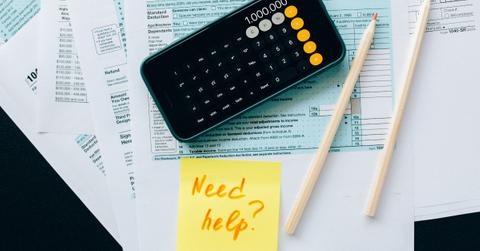Why Federal Income Tax Wasn't Withheld From Your Paycheck
Here are a few reasons why no federal income tax may be withheld from your paycheck. If taxes aren't withheld from your paycheck, you need to know why.
May 7 2021, Published 2:10 p.m. ET

As the saying goes, nothing is certain except for death and taxes. So, if federal income taxes aren’t being withheld from your paycheck, you should find out why. Otherwise, you could get a giant tax bill at the end of the year.
When you receive a paycheck, a certain amount of the money you earned is withheld by your employer. Your employer sends that money to the IRS on your behalf. This is referred to as federal withholding tax.

Several factors are used to determine whether you need to pay income taxes and how much you are required to pay. Those factors are gross income, filing status, number of dependants, and age.
You provide this information when you fill out a W-4 form when you start working for an employer. You can make changes to your W-4 at any time if you want more or fewer taxes withheld.
Here are a few reasons why federal income tax might not be withheld from your paycheck.
You don’t make enough income.
The amount of federal income tax you owe largely depends on what your income is. The more you earn, the more you are required to pay.
The percentage of tax withheld from your paycheck depends on what “bracket” your income falls in.
For example, for 2021, if you’re single and making between $40,126 and $85,525, then you are responsible for paying 22 percent of your income in taxes to the federal government.
However, if you make less than $9,000, you might not have to have taxes withheld.
You claimed "exempt" on your W-4.
Federal income taxes also won’t be withheld from your paycheck if you claimed “exempt” on your W-4. To claim exempt, you must:
- Owe no federal income tax for the prior tax year
- Expect not to owe federal income tax in the current tax year
Both of these criteria must be met to claim that you are exempt. Otherwise, you could owe substantial taxes and penalties when you file your tax return.
You are an independent contractor.
During the COVID-19 pandemic, with the increase of people working from home, more people are working for companies as independent contractors. In 2020, an estimated 14 percent of workers considered themselves independent contractors.
Independent contractors aren't technically employees, so the employer isn't required to withhold taxes from their paychecks. However, you still have to pay federal income taxes as an independent contractor.
Instead of receiving a W-2 form showing how much taxes were withheld from your paycheck, independent contractors receive a Form 1099-MISC that reports your income for the year.
Independent contractors, freelancers, sole proprietors, and self-employed workers also have to file a Form 1040 to report their income.
Ask if you have questions about federal withholding taxes
If you are concern that there might be a problem with your federal income tax withholding, you should talk to your employer. Talking to a professional tax adviser would also be a good idea.
